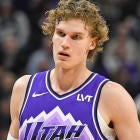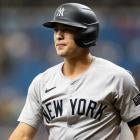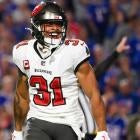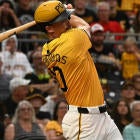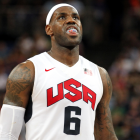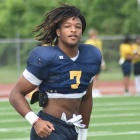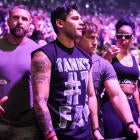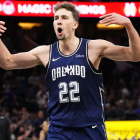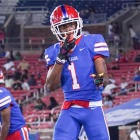In a gym in Michigan is a college athlete with an unusual resume. At 24, Max Hooper has played ball at Harvard and St. John’s, earning a degree at the latter, and now boasts college basketball’s most peculiar stat line.
For 15 years, he’s heard that word -- SHOOTER! -- yelled his way. And now he's the third-leading scorer for Oakland all the while not taking a single 2-point shot all season.
You read that correctly.
Max Hooper averages 11 points a game for the Grizzlies and has taken 214 field goals, all of them from behind the 3-point line. Hooper ranks third in the nation currently in made 3-pointers and would lead in free-throw percentage as well at 94 percent if he qualified. He’s made 18 of 19 attempts.
In a sport where young players try and show everyone how much they can do, Hooper, who entered his playing career at Harvard with a 4.7 GPA in high school and a 2,200 SAT score, is smart enough to do what he does well, and nothing else.
With a surname like Hooper, one would think Max was destined to ply his trade on the hardcourt. While Max’s dad never played basketball, he did pass along the family’s defining trait: a legendary work ethic. Max Hooper was born in Carmel, California in 1992.
In 1994 his father, Chip, was a fairly successful booking agent working for Monterey Peninsula Artists. On a lengthy trip Chip was looking for the next great touring band. The job is a grind. Late nights in small college towns trying to find the right group with the right style and perfect sound.
On New Year’s Eve he called his wife and told her that he, “had to see this guy perform at Ziggy’s Bar in Winston-Salem, North Carolina.”
He just had a feeling. “I just saw a band that will change our lives forever,” he said. That artist was Dave Matthews.
Chip Hooper became his booking agent. For the past 22 years, if you have seen a DMB show, it was booked by Chip Hooper, the country’s best booking agent. In the 1990s DMB, Phish and Blues Traveler were all clients. DMB and Phish still are today, as well as hundreds of others. Chip Hooper had found what he did well, and excelled at it. But this is a family story about will, indomitable will.
When he was 4 years old, Max Hooper was in a Utah ski lodge room with his dad. The weather was awful and they turned on the tube. It was 1996, the Jazz were on TV and young Max fell in love.
"The Jazz are the best basketball team in the world," Max told this to his Chicago-born dad, who explained that although he wasn't a basketball guy, the Bulls and Michael Jordan were the best. It was at that moment, 20 years ago that Max proclaimed his love for basketball and the Jazz. His dad’s Bulls would go on to win the NBA title and a love of the game was forever forged.
While mad his team ultimately was not the best in the world, Max met his first love in that Park City hotel room -- basketball.
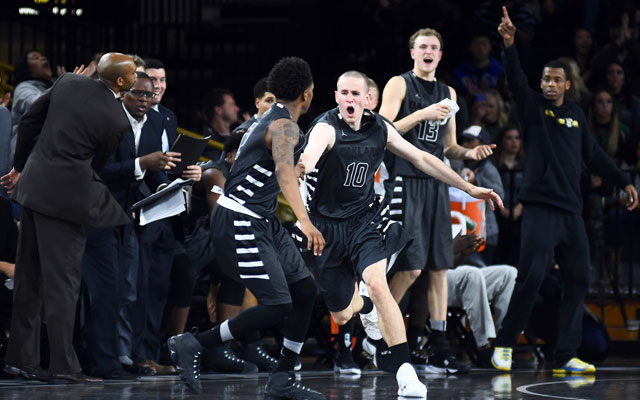
Basketball became Max’s life. At one concert, Robert Randolph was the opening act for Dave Matthews at the Shoreline Amphitheatre outside of San Jose, California. To keep Max busy Chip gave him his usual $20 to play pop-a-shot and kill time. Max, with his blossoming shot, returned with $40.
Chip Hooper would go on to further facilitate Max’s hoops passion. Chip drove home in and around Carmel, California to parts unknown in the pursuit of Max’s basketball dreams. When high school came around, they toured East Coast prep schools and West Coast private schools. They settled on Valley Christian in San Jose, an hour and a half from the family’s Carmel home. Chip got an apartment and Max stayed there as his mom, Laura, and dad would switch off staying with him, occasionally leaving the 14 year old to his own devices.
Those devices? A gym and a ball as Max would go on to make a California freshman record 10 3-pointers in one game. By Max’s junior year he was playing high level AAU ball, joining a team in part because he impressed current Bucks player Jerryd Bayless with his ability to shoot as a freshman.
Meanwhile, Hooper had outgrown Valley Christian and chose Mater Dei, coached by Hall of Fame nominee Gary McKnight in Santa Ana, California. Chip moved the entire family to Irvine for his son’s senior year. He enlisted the help of former Mater Dei and Arizona Wildcats star Miles Simon as his son’s workout guru and began to field scholarship offers to play at the next level.
Despite being an elite student, only two West Coast schools offered him a Division I scholarship. During the recruitment process, Max visited Oakland University in Michigan, which had a great 3-point shooter in Travis Bader. Max thought he could replace him similarly as Bader had replaced Erik Kangas, who played the same role for the Golden Grizzlies. But Max ultimately believed he could get an offer from a higher level school, so he passed. Despite the interest from Oakland, Hooper didn’t think he could play right away, and neither did many high-level or even other mid-major schools. Undeterred, Max and his dad looked for post-graduate options and decided upon Brewster Academy in New Hampshire.
His roommates were JaKaar Sampson and Mitch McGary, and the team featured 10 or so Division I players on the team. McGary and Hooper were the first “big” and “guard” off the bench. Despite averaging 10 points a game for Brewster, Max’s scholarship prospects seemed fairly limited. Nearby Harvard, a program that doesn’t award athletic scholarships, wanted Max and he decided that Tommy Amaker’s deep recruiting class would always need a shooter.
Shortly after Max’s first few games in a Harvard uniform Chip called Max at his Cambridge, Mass. dorm room. Cancer. Not just any cancer, neuroendocrine cancer, among the rarest forms of cancer in the world. The cancer was so rare that treatment options stateside were limited, but Chip Hooper thought nothing of his prognosis and told his son not to worry. Like looking for the next great artist, Chip would travel to the ends of the earth to find the best treatment. Chip Hooper’s will wouldn’t let cancer stop him, so Max shouldn’t worry he told him. Max didn’t.
Max played in just two games at Harvard during his freshman season. One of those games was an exhibition against a D-III team. He was at a loss. Was he brought there to simply raise the incoming recruiting class’ Academic Index he wondered? The index is an average of all SAT/ACT/GPAs of incoming recruits to Ivy League programs. The league has raised the index to combat some students getting into Ivy League schools as exceptions, but with unlimited non-scholarship players, the average can be raised with brainiac kids who are happy to be there.
Was he not wanted? Hooper did not know, he simply never thought he would play and made the decision that spring to find a school that needed a shooter. Max Hooper’s will wouldn’t let him not get a chance to play Division I basketball. Like his dad as an agent, he would scour the ends of the college basketball earth for the next place to play.
Chip Hooper, meanwhile, had found treatment options in Europe, because, well that was Chip Hooper.
His former roommate, Sampson, had been telling Max since their days at Brewster that St. John’s and Steve Lavin were bringing in a bunch of stars, but they needed a shooter. Hooper was in. He was the ninth guy in a nine-man recruiting class that finally last season went to the NCAA Tournament.
After sitting the NCAA mandated year, Hooper still played little, as he struggled with spacing the floor and wasn’t seen as athletic enough to guard Big East wings. Despite the Red Storm’s clear need for shooting, Max couldn’t crack the code to earn enough minutes to feel like he was a part of their future. Hooper graduated after two years in Queens, playing just one season (after sitting out the NCAA mandated year) averaging 3.2 points per game, while shooting 41 percent from beyond the 3-point line.
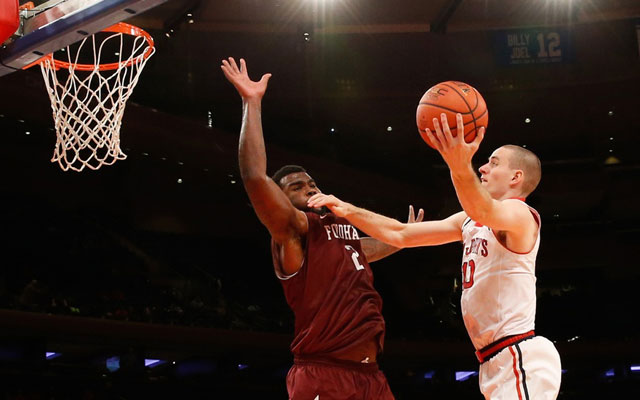
Max had visited Oakland during both his first and second (leaving Harvard) recruiting visits, so the Golden Grizzlies coach, Greg Kampe, was familiar with him, but he wasn’t going to beg.
“We aren’t going to recruit you, but if you want to come, you have a scholarship,” Kampe told Hooper on the phone. Hooper went on an unofficial visit, but he already knew, Oakland was perfect. Kampe always had a shooter, and Hooper was more than good enough. The first day of practice Kampe told Hooper he would shoot 300 3-pointers his first year, Hooper was thrilled and a little shocked. He had only shot 62 3-pointers at St. John’s the year before.
His junior season wasn’t great. Hooper hadn’t really ever played college basketball and he just wasn’t ready for the workload on the floor. After the season he asked the video coordinator to clip every jump shot off of every set to review it. Hooper hadn’t had real great game tape to evaluate since his high school days and now he could work on what the film told him he was missing in his game. Once again undeterred, Max set out to find his game, even if it took to another distant locale.
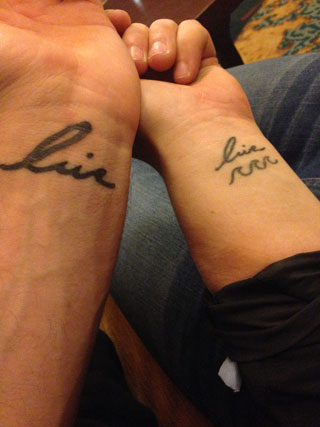
Hooper worked out for six weeks with Anthony Morrow in the offseason in Charlotte, North Carolina. He spent six weeks training with one of the NBA’s best off-the-bench snipers to in the hopes of becoming a college sniper. Mission accomplished. Hooper found the perfect 3-point shooting artist to train with, study and relate to, and the two still stay in touch.
Max returned to Oakland University, ready to finish his Masters in Public Administration and college basketball. The team had gone on a trip to Spain and Hooper was now ready to assume the Travis Bader role, which translated to: shoot when you are on and when you are off ... shoot until you are on. Then he got a phone call on Oct. 22, 2015. His dad’s cancer, which seemingly hadn’t affected him for four years of treatment professionally, had caused a stroke.
Hooper flew home and huddled with his younger sister Valerie, a 20-year-old Duke junior. Valerie decided to take the year off at Duke. During her junior year, the year she turned 21, she wanted to care for her dad, but told Max, “you have to kill it this year, for him”.
People poured into Chip Hooper’s hospital room. Amidst all the white noise of friends and doctors wishing well and planning his rehab, respectively, Chip tuned everyone else out and locked in on his favorite artist playing on television, Max. And Max continues to play, and “kill it” at Oakland.
Most people would have considered quitting playing basketball at Harvard and just earned a degree from arguably the country’s finest institution. Not Max Hooper. Some may have quit when their doctor informed them of cancer prognosis, but not Chip Hooper. Where does will come from? Where does the confidence of a 6-foot-6 white kid from picturesque Carmel grow from when the tough streets of the basketball world tell him he can’t play at this level? Every night before Max goes to bed he has a routine with his father. For as long as they can remember they each say three lines to one another:
Chip: I believe in you.
Max:I believe in myself.
Chip: I believe in your dreams.
Max:I believe in my dreams.
Chip: You are going to make all your dreams come true.
Max: I’m going to make my dreams come true.
“February 26 is our senior night,” Max tells me. “I have no idea if my dad can make it, but if you know my dad, he will probably be here somehow or someway. If not, I dream of him watching me in the NCAA Tournament. Kay Felder [Oakland’s star point guard] finding me for an open look and my dad watching me in The Big Dance. This is our journey.”
The Hoopers talk every night, or close to every night. Their conversations are deep, thoughtful, memorable.
“My dad’s will to help me is unlike anything anyone has ever seen,” said the younger Hooper. “He was the dad who would would buy a trunk full of Gatorade for the entire AAU team after games. He would move our family for me, hire a workout coach for me, do anything he could for me to live out my dream.”
Chip Hooper isn’t supposed to be here. Without seeking treatment in Europe, without his will, his fight, cancer could have taken him years ago. During that time he has won four agent-of-the-year awards. He is ranked on Billboard’s 2015 Power 100 List, his will to live is indomitable. Chip Hooper is the rarest of men, with a rare cancer and his son embodies his will with his own personal touch on the basketball floor. Like the three lines he recites with his dad each night, he only shoots threes.






